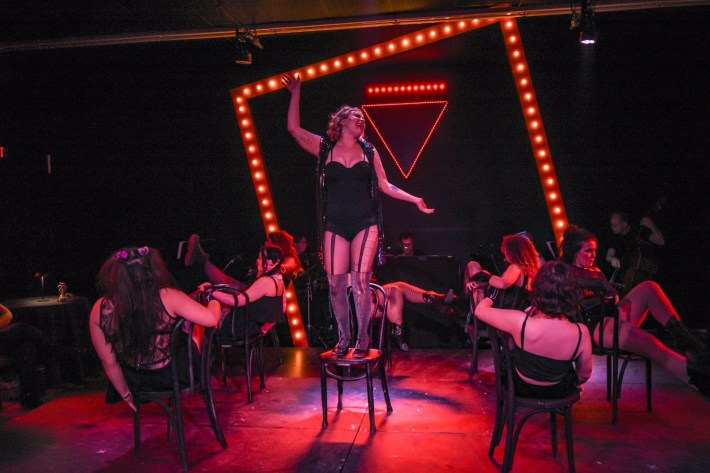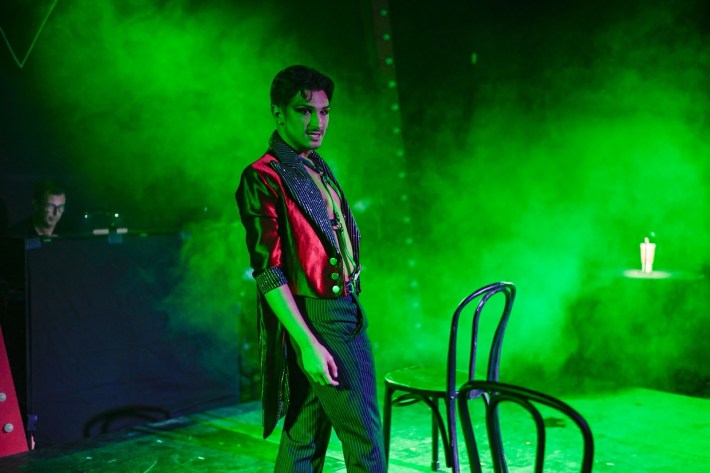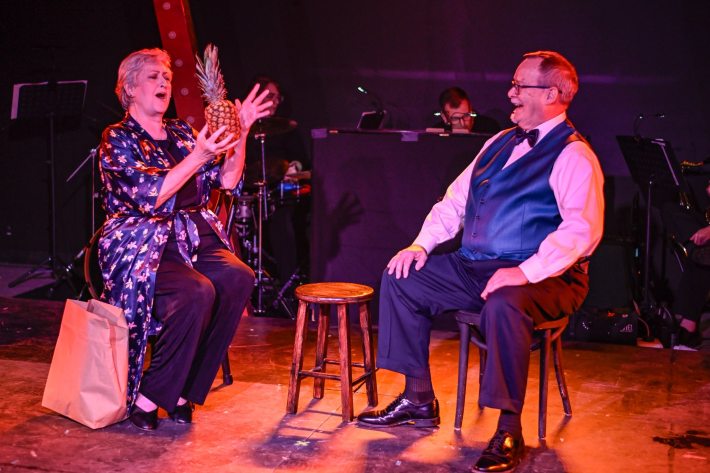Theatre Tulsa: "Cabaret"
Theatre Tulsa Studios
June 22, 2025
I’ve never seen a live production of Cabaret, yet it is one of the musicals universally adored by theatre nerds. A college assignment brought the 1972 film adaptation starring Liza Minnelli and Joel Gray to my attention, but if I’m honest, all I remember from that viewing is a claustrophobic boarding room and a lot of weird song and dance numbers at a nightclub. So, knowing it was a highly regarded piece of art, it’s been on my list to catch.
The events in Cabaret derive from the award-winning book Goodbye to Berlin by Christopher Isherwood. The semi-autobiographical account follows Cliff Bradshaw, an American writer who travels to Berlin to work on his next novel. He quickly becomes engrossed in the hedonistic, vibrant world of the Kit Kat Klub and its star performer, Sally Bowles. The book is known for its striking portrayal of the final days of Weimar-era Berlin before the Nazi party took power. The musical has had several revivals since its Tony Award-winning debut in 1966. The most recent, billed as Cabaret at the Kit Kat Klub, reimagines the play in a more immersive way, with audience members sitting around all sides of the stage, which is how Theatre Tulsa stages their version—every performance of which sold out before opening night even arrived.
It’s remarkable how some black paint, LED lights, and a sneaky smoke machine can transform a former Family Dollar into a nightclub, even at 2:00 in the afternoon when I saw the show. Compared to some of Theatre Tulsa’s more recent sets, this one was minimal. A raised platform set the performers a few inches above the ground. Some chairs, the occasional side table and an askew frame adorned with lights made for a versatile backdrop that allowed the action on stage to shift from the Kit Kat Klub to various locations outside it. A four-piece band in the back expertly delivered the score and the audience rounded the three other sides of the stage.

For an extra $10, you could sit at a bistro table up front, but I opted for the cheaper general admission ticket. After carefully selecting my seat, I worried my view would be obstructed. But when Theatre Tulsa says this is an immersive experience, they aren’t kidding. While a lot of the main actions took place on the stage, the actors moved freely amongst the crowd. Brief transitional scenes happened within the audience. Props and empty chairs, brought onto the stage during certain scenes, were strategically placed on and around the bistro tables. I was pleasantly surprised to be able to see everything and alarmed when the major fistfight at the peak of the musical happened literally right in front of me. My momentary panic aside, it’s hard to imagine watching Cabaret in a more traditional theater. When staged like this, it makes the audience feel like they are a part of the story, and this meta element becomes a key component in the production’s power.
A sleepy Sunday matinee after a long tech week did not deter this energetic cast, even with a few dropped lines that halted the pace at one point in Act One. The Kit Kat Girls (the female ensemble comprising Madison Green, Aubree Harper, L’aria Krautter, Prudence Lloyd, Haley Sandford, Sofia Thornblad, and Manda Yarberry) brought a sexy energy that slapped a goofy smile on my face and had me giggling throughout the opening number. Liz Masters and Bill Hader were absolutely charming as Fräulein Schneider, the world-weary landlady of the Berlin boarding house where Cliff resides, and Herr Schultz, the Jewish fruit vendor who also lives there. Kara Young-Paden’s Sally Bowles bubbled across the stage, spouting aspirations, desires, a quick joke or deflective comment, diffusing the tension and brightening the room with natural ease; you see how Cliff becomes so taken with her. As playful as he was haunting, Joshua Terrones commanded the room as Emcee, the host for the Kit Kat Klub and the musical as a whole.


With Travis Guillory’s keen direction and sharp choreography, the musical consistently engaged me, but as the first act went on I kept wondering … what’s the point of all of this? I had an idea of where the plot was heading, knowing the musical takes place in Berlin and clocking the line about Cliff reading Mein Kampf. It was hard to be completely taken with the charm as I waited for the other shoe to drop. I wanted it to drop. Show me why this musical is so great! I wasn’t convinced yet.
I got what I wanted in the final scene of Act One. The characters gather to celebrate Fräulein Schneider’s engagement to Herr Schultz. Cliff (Chris Porcelli) arrives late, having gone to Paris to run an errand for his friend and English pupil Ernst Ludwig (Fletcher Gross) to earn some extra cash. It’s revealed that Ludwig is a Nazi and the errand was for his political party. Understandably, this tanks the mood, onstage and in the audience. In an attempt to liven up the party once again, Fräulein Kost (Jennifer White), another resident at Fräulein Schneider’s boarding house, begins a rousing rendition of “Tomorrow Belongs to Me,” a song from earlier in the play that alluded to the rise of the Nazi Party. At first, only White sings. Then, to my horror, most of the cast joins her in passionately singing the song and doing the salute. Yeah, that one. As the lights went up for intermission, one woman in the audience said it best: “Oh, that was chilling.”
As an audience member, you start to wonder: how could the characters not talk about the politics of the time sooner? Why did it take this long? But then you remember how fun and thrilling the first act was. How much you were enjoying it. How you didn’t walk out or roll your eyes, even though a tiny part of your brain was calling bullshit. It’s easy to get lost in the spectacle.
Act Two breezes by as we see how each character reacts (or doesn’t) to the information that Nazism has quietly invaded their everyday lives. Fräulein Schneider ends her engagement, fearful for her personal safety. Herr Schultz moves to a different boarding house, but seems to think the growing discontent will pass quickly. “Governments come, governments go,” he says as he takes his leave. “What do we do? Wait until the next election.” Haunted by his actions, Cliff insists on moving home to Pennsylvania with Sally. The giddy tone of the first act is shattered for everyone. The only character who can’t seem to accept the change is Sally, who performatively brushes off the event as “politics” and proceeds to grasp onto ignorance as tightly as Young-Paden clutched the mic stand while bellowing the titular and penultimate song.

But before the Emcee wishes the audience farewell in the show's final number, the production takes a deviation. We step outside the “story” for a moment. The possibility of staying lost in the spectacle is erased, and the cast makes sure we don’t leave the theater in denial. I won’t go into details; I don’t want to spoil it. What I will say is that Theatre Tulsa does not shy away from the themes and message of the musical and is not afraid to make the audience uncomfortable.
This Cabaret is a bold statement. I commend Guillory and his team for taking the leap—it’s not lost on me that an organization with 100+ years of history in Tulsa does not make an artistic decision like this lightly. And you best believe, I won’t forget it anytime soon.






